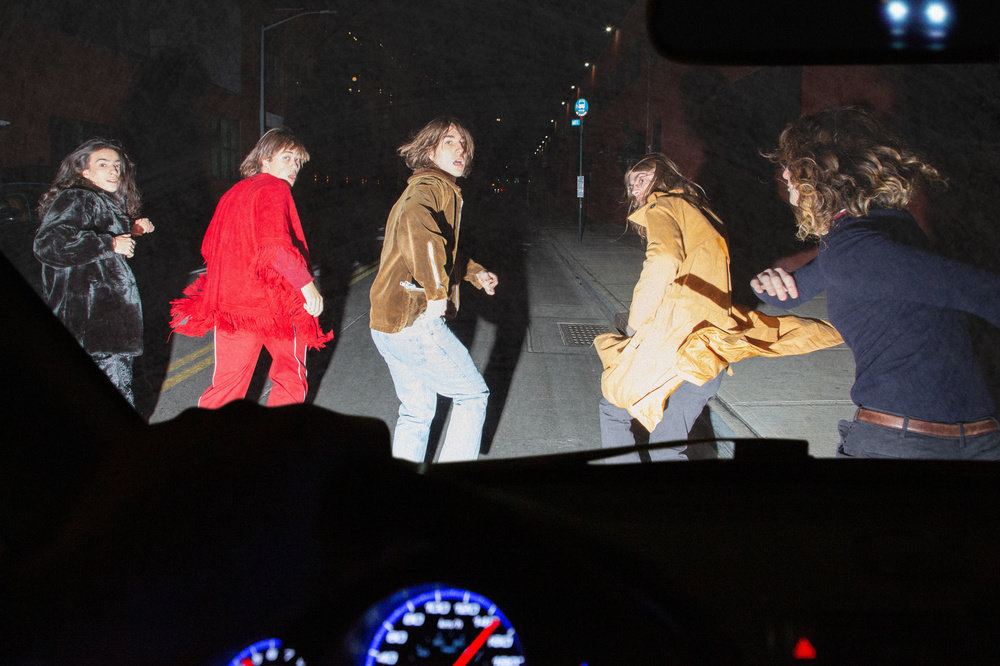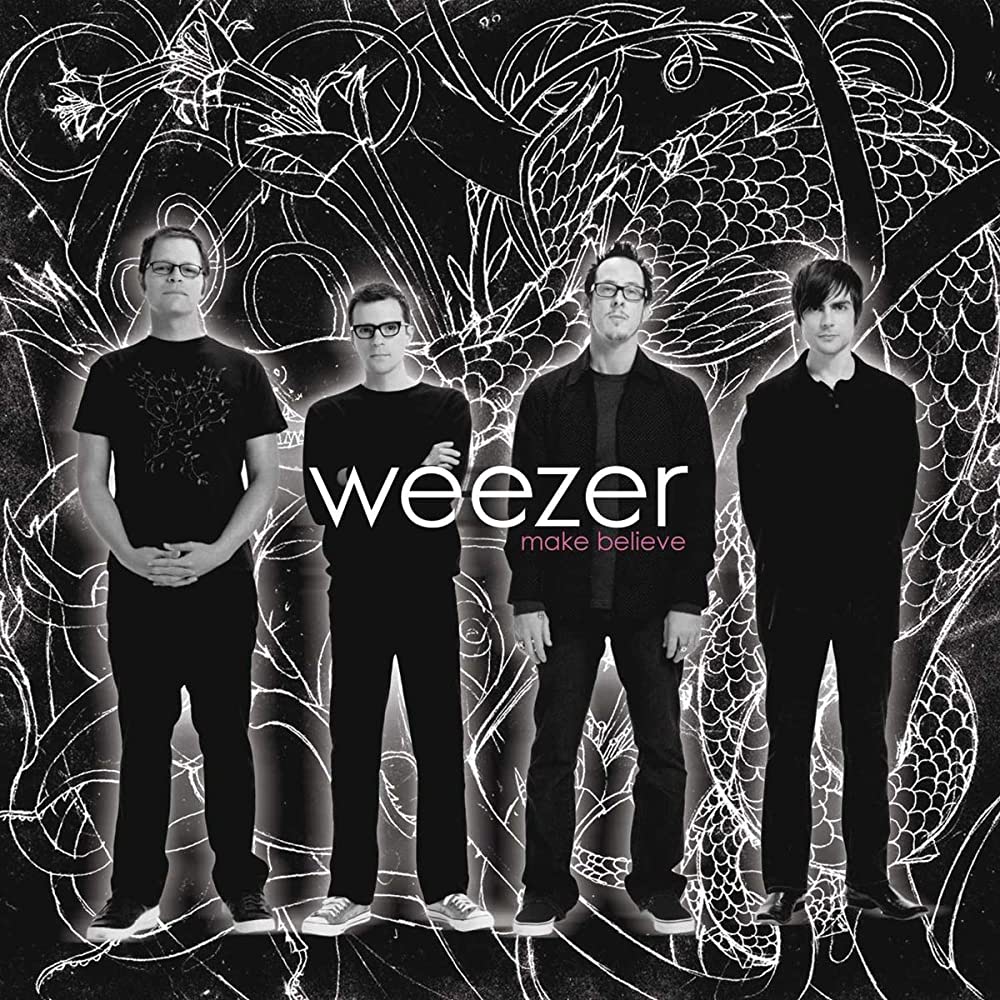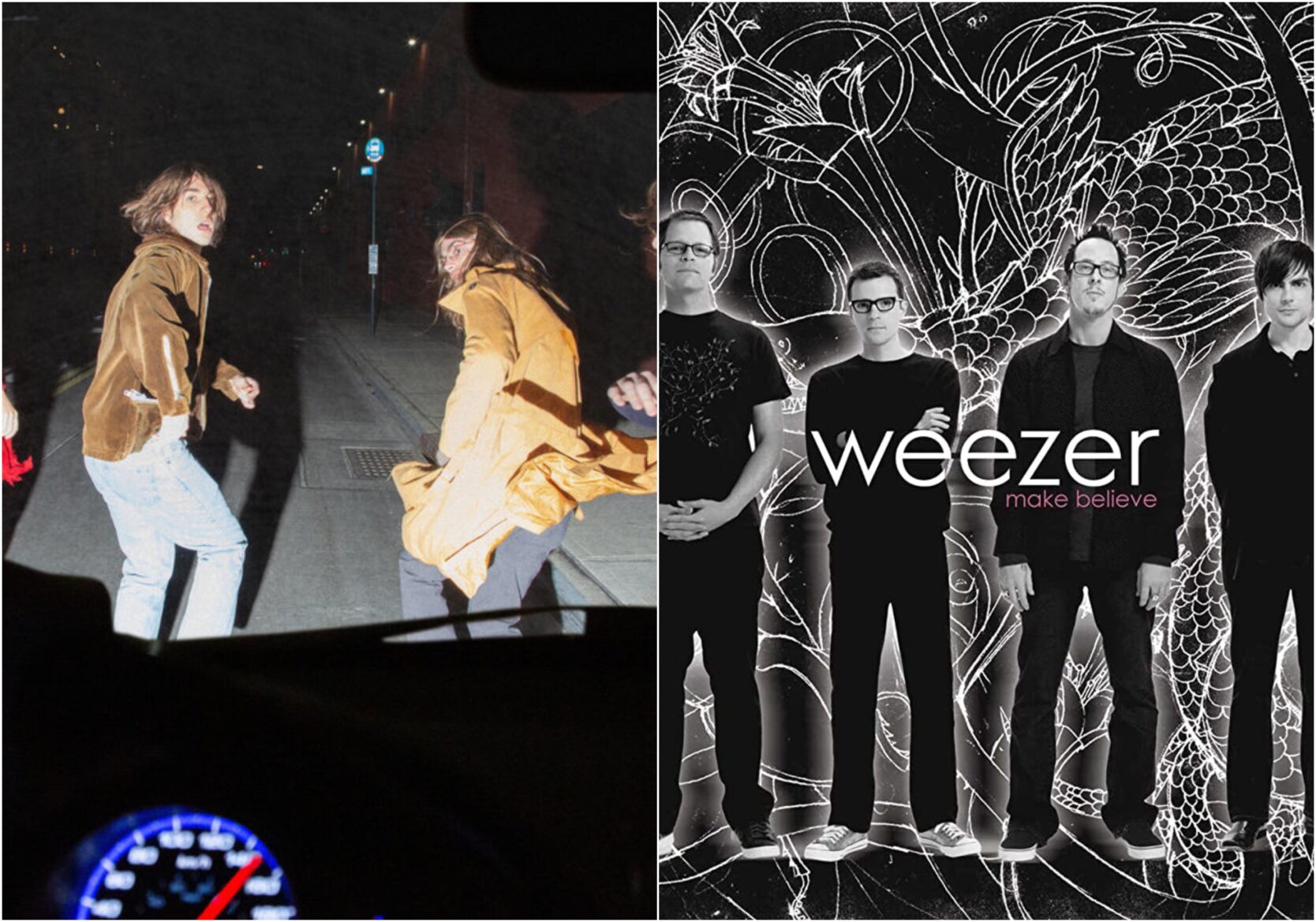Welcome to Band Jury, a SPIN series in which artists defend black sheep albums they feel deserve another listen. These are projects that, for whatever reason (middling sales, negative reviews, a misunderstood stylistic shift), have fallen slightly out of fashion — or perhaps never reached it to begin with.
The Defenders: Cameron Winter and Foster Hudson
Qualifications: Singer/keyboardist (Cameron) and guitarist (Foster) of Brooklyn post-punk band Geese, who will release their second album, 3D Country, on June 23; humans who enjoy music

The Defended: Weezer’s 2005 album, Make Believe
Overview: Mixed critical reception, including a 52 on Metacritic; peaked at No. 2 on the Billboard 200; spawned four singles: “Beverly Hills” (No. 10 on the Hot 100), “We Are All on Drugs” (No. 10 on the U.S. Modern Rock chart), “Perfect Situation” (No. 1 on the rock chart), and “This Is Such a Pity” (No 31 on the rock chart); shockingly low score (2.1/5.0) on fan-review site RateYourMusic

“What is quality?” Cameron Winter asks SPIN, reflecting on the Weezer catalog during a lengthy, hilarious, and sorta profound monologue. “Quality is something that’s completely subjective and not real. Weezer doesn’t conform to some dimension-like quality. Rivers Cuomo is like the fucking buddha.”
The Geese singer has strong feelings about this perpetually divisive alt-rock band, whom he heard first as a kid during family car rides to Long Island. That timing is crucial here — Winter had no preconception of music critic “cool,” and he couldn’t have cared less that Weezer’s review scores were starting to plummet. “[T]his was the first Weezer album I got to know well,” he says. “Maybe that’s why I haven’t discounted it. I didn’t come across it when I was an insufferable music nerd.”
By 2005, Weezer had been a world-famous rock band for over a decade, navigating enough twists and turns — the breakout success of The Blue Album; the exit of bassist Matt Sharp; frontman Rivers Cuomo baring his soul on Pinkerton, briefly attending Harvard, and bouncing between intense soul-baring and detached slickness — to fill an excellent biopic. They were still a major commercial force: Make Believe, their fifth record, hit No. 2, and “Beverly Hills,” a wah-stuffed single about a nerd longing for the rock star life, was inescapable for a brief time.
But in retrospect, this album seems like a pivot point for critics: Despite a few high-profile raves (Rolling Stone’s Rob Sheffield handed out four stars), the numbers were trending downward: On aggregate review site Metacritic, the album wound up with an unimpressive 52 — 20 points fewer than their previous LP, 2002’s Maladroit. The New York Times called the songs “infuriatingly plain”; cokemachineglow argued that Cuomo was “donkey-punching the formaldehyde-soaked corpse of his former glory”; and Pitchfork notoriously gave the record a 0.4/10, concluding, “Sometimes an album is just awful. Make Believe is one of those albums.”
From that point on, Weezer have — with a few exceptions — also been punching bags of hard-headed hipsters, even inspiring a now-classic SNL sketch about that polarization. (“I’m just a little confused because real Weezer fans know that they haven’t had a good album since Pinkerton in ‘96,” argues Leslie Jones’ character during a heated dinner party.) On RateYourMusic, 10 of their 16 official LPs have lower than 3.0 rating — only four rank beneath Make Believe. (“Are you fucking kidding me?” one listener wrote. Another: “The songwriting is so unaware at how bad it is.”)
But Geese think everyone should give Make Believe another chance — and hopefully reconnect with their less cynical side.
“If you’re a jaded music fan and you’ve listened to 4,000 albums and you’ve perfectly ratioed your RateYourMusic account and you cast off Make Believe years ago, go back to it and remind yourself of a time before all the ratings, when you were younger and every record was good,” says Hudson. “That’s what Make Believe reminds me of: when every record was good.”
Cameron: I’d like to know first, Ryan, where you fall on this spectrum of love and hate.
SPIN: I actually like Make Believe, though I’m sure nostalgia has something to do with it. I was unaware of the reviews, and I remember genuinely loving a few of these songs, including “This Is Such a Pity.” I’m still not sure what I think about “Beverly Hills,” though it’s definitely an ear worm in its own ridiculous way.
Make Believe doesn’t have the depth of, say, Pinkerton — by this point, they’d entered a new phase of surface-level slickness. But if you stack it up side by side with Green Album, I don’t think there’s a huge difference in quality. Looking at the whole Weezer catalog, it’s probably middle of the pack for me. What about you?
Cameron: I’d be similar to you — middle, maybe right above the middle. That’s not bad because Weezer has an extensive fucking catalog.
Foster: Yeah, extensive in both quantity and quality.
Cameron: That’s my point. That’s part of my whole thesis. Listen: Weezer is one of the most personal bands to ever exist. They’re ultimately unknowable. You can try to figure them out, but you never will because you’re not them. There’s this barrier between you and everyone else. People are multi-faceted, and who someone is can’t be summarized in one song or an album or even an entire career — no matter how plainly you may bare your soul, no matter how unadorned how music might communicate. This is encapsulated very beautifully by Weezer’s entire arc.
[That’s] the complexity of a person like Rivers Cuomo — on the exterior, he reads like an intern. He reads like a man aspiring to a job in data entry. He reads uncomplicated. He reads manageable. He reads milquetoast. But this man has taken artistic risks that are comparable to the perils faced by Apollo astronauts or Evel Knievel or someone of that caliber.
He’s so much more than what meets the eye, and his entire career has been a reflection of that. He’s changed. He’s metamorphosized over and over again. He has done it with such seeming randomness that even people who are paid salaries to contextualize and explain bands and music, who pride themselves on having a bird’s eye view of what these artists are making, can’t make heads or tails of it. They can’t understand Rivers Cuomo because he’s fucking unknowable. And he communicates that in everything he puts out.
Foster: I want to point out that Cameron has a whole Google Doc he was reading from that was like his debate prep for this moment.
Cameron: I was for the first half, and then I went off-script. This is what good music does. It touches you. It brings something out that you didn’t know was there. Make Believe is not fucking A Love Supreme. It’s not going to lift you up to heaven and show you God or something. It doesn’t have that ambition, and that’s OK. Music has different ambitions. One piece of music, as much as it may try, can’t make you feel every emotion at once all of the time. I think Make Believe is just a set of good songs that reflect where Weezer was at that time, brutally. Brutally.
Foster: I didn’t listen to this record that much, and then we got the call for this interview, and Cameron mentioned Make Believe. I thought the idea was pretty funny, so I went back to it, and I thought it was pretty underrated. The thing about Weezer — especially at this point in their career, Green Album onward — is that they were really into ‘80s hard rock, hair metal: Cheap Trick, Van Halen, huge bands. All that music is based around a persona, the idea of a person that the listener also aspires to be: a guy who gets chicks, who is around a bunch of celebrities, does drugs all the time; nice car, super rich. The thing about Weezer, though, is that there’s no artifice between the listener and Rivers. It’s just Rivers!
When Rivers writes a song about celebrities and cars and drugs, it’s not about that — it’s about how Rivers wants that. It all comes back to Rivers Cuomo. Every Weezer song, especially the big pop songs, just want you to come enjoy the emotions, feel what Rivers is feeling, bang your head to the riffs. Sure, there are other records that are better and more complicated and [require] more brain power. But there’s nothing wrong with music that takes the straightforward path.
You mentioned all these hard rock bands — Rivers even directly sings about his “favorite rock group, Kiss” on the Blue Album song “In the Garage.” That very relatable desire to be famous, to do something big, has been part of his persona from the beginning.
“Beverly Hills” was the hit from this album, and like you said, it uses this trope of the rock star lifestyle. Then we see the real-life Rivers as this nerdy guy who’s seemingly the opposite of the generic hard rock god. That contrast between persona and human makes the whole experience infinitely more interesting.
Cameron: You’re exactly right. There’s this tension in everything he does with the bombast. Think of Van Halen — they came alive right at the peak of the hair metal scene. Their entire aesthetic was rock archetypal — we’re gonna fuck everybody in the world, play loud-ass music, “fuck you, go jump off that cliff, do your thing.” All of that sort of wild living. And Weezer is such a nakedly human imitation of that because no one’s fucking everyone in the world — Rivers Cuomo certainly isn’t. And he knows that about himself, you know?
Weezer came to popularity at a time when uncool suddenly became cool — that sort of alt-rock time. Even those people who, on paper, through a magazine photo, seemed uncool and seen therefore, counterintuitively, as cool because of that. Weezer were so uncool that they transcended uncool. They took “uncool as cool” to its logical endpoint, where they’re so fucking uncool they do the most uncool thing possible, which is “sell out.” They haven’t sold out in the traditional sense, though. They challenged the entire idea of selling out by going back and forth. They aren’t on some trajectory where they crossed some threshold where they’re now this plastic, stupid band who never makes anything good anything. Sometimes the hat you try on is a more commercial hat.
Sometimes one hat has an awkward fit, and then you put on another one that fits a little better.
Cameron: Scientists used to think there was nothing on the ocean floor, and now they think it might be the most biodiverse place on Earth. To me that’s Weezer in a nutshell. You can see “Beverly Hills” in the corner of your eye, or you hear “Buddy Holly” and think, “I recognize that song.” Then you realize, “This is a man who’s sacrificed everything multiple times to bare his soul before the world, to know himself.”
When did you first hear Make Believe? Were you already a fan?
Cameron: Some of my first exposures to music were in car rides with my parents. We used to go to Long Island every weekend. We’d hop in the car, and my dad would put on The Killers, Keane, Coldplay — very piano-rock, commercial-type stuff a lot of the time. He would put on this album, and this was the first Weezer album I got to know well. Maybe that’s why I haven’t discounted it. I didn’t come across it when I was an insufferable music nerd. I was wide-eyed.
There’s some kind of lesson in that. When you hear things as a kid, you’re more open and not as hardened in your opinions of what you think is cool and uncool. But let’s go back to “Beverly Hills,” the song on the album that people know. A lot of people write off Make Believe because of it — I think that wah-wah solo has a lot to do with it.
Foster: Yeah, that wah-wah, man. It just ruins some of those solos so badly.
Cameron: The wah is one thing — it’s a little hard on the ears, straight-up. But tell me how “Beverly Hills” is that much more egregious than “Hash Pipe.” They’re both stomping, clapping, “corny” lyrics. [Mimics riff] People only have a problem with “Beverly Hills” because it got popular. That is the ultimate fucking thing about music nerddom and armchair music analysis — the popularity is so important to whether people are going to give it credit or not.
With something that sounds poptimistic and palatable but doesn’t succeed on a big scale, people on RateYourMusic have a much easier time saying, “Oh, yeah, this is cool. I like this!” But if it succeeds, they need to get taken down a peg. It’s all about the critic. Early Pitchfork especially was guilty of this. It’s all about, “What do I think about this?” It’s not about trying to understand the art or trying to help the art accomplish its goals. And that’s fair enough.
Back to the wah for a second: I wonder if they leaned into that because it fit the aesthetic and theme of that song. Is it possible they were being ironic?
Foster: It seems difficult for me to think of anything that Weezer does as ironic. I think if they did something like that, they probably love any of that music too much to treat it ironically.
Cameron: I don’t think there’s much irony in Weezer ever — that’s sort of the thing. Irony is a way of distancing yourself from having to be cool or uncool: “Ooh, you have to really think about me to understand me,” where it’s begging to be analyzed. Weezer doesn’t do that. This album is direct. Listen to the lyrics. There isn’t a single fucking metaphor or simile or aphorism to be found on the whole thing. It’s telling you, “This is such a pity / We should give all our love to each other / Not this hate that destroys us.”
It’s so direct and blunt. People find that bluntness to be appealing to the lowest-common denominator, but I really think it’s breezing past all this poetry that Rivers feels is bogging his message down. He wants to say something really simple and do it with a catchy hook.
Foster: Weezer are not a critics band. They’re there to please people who don’t listen to music all the time, but they want something simple and easy that they can get into, and there’s nothing wrong with that. There’s no reason to think that’s less than the music I like because I listen to a lot of music and know a lot about music. Make Believe is poppy, maybe a bit to a fault, and open, maybe a bit to a fault, but also a little angsty. When I was listening to it, I was like, “If I was still 13 or 14 and came across Make Believe, I would probably really like it, and maybe that would lead me over to some more music after that.” I think that’s valuable in and of itself.
Any final thoughts?
Cameron: If you really give [the album] a chance, I think you’ll learn something about yourself.
I think you learn something with every listening experience — and definitely with Rivers.
Cameron: He has a lot to teach fucking humanity, man.





